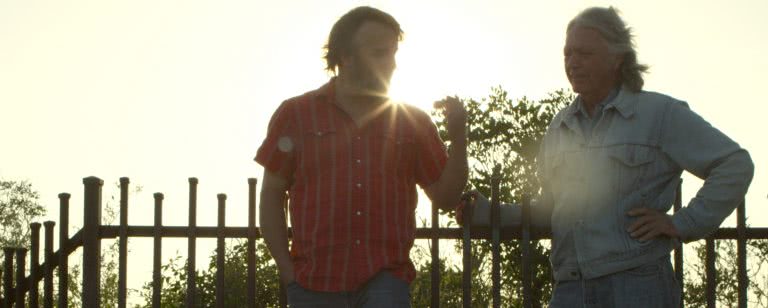On a surface level, filmmakers Richard Linklater and James Benning seem worlds apart – Linklater is a narrative filmmaker who, following his landmark micro-budget filmSlacker(1991), has juggled indie and studio productions alike, while Benning is associated with the world of non-narrative and avant-garde filmmaking, and has a particular interest in landscape; his is a type of cinema that has a marginal presence even at film festivals. In Benning’s case, this year’s Sydney Film Festival tagline – “Together in the dark we share our stories” – accounts more for what we bring to his films rather than the other way around.
The documentary Double Play: James Benning And Richard Linklater is a snapshot of the friendship between these two filmmakers (Linklater was a former student of Benning’s), which looks at them with fresh eyes and doesn’t shoehorn them into a neat dichotomy. The film’s director, Gabe Klinger – a critic, programmer and scholar who has also curated a mini-retrospective of Benning’s films for this year’s festival – explains the rationale behind their pairing.
“Conceptually, it worked to have these two figures who superficially are different, but then when you start to look, have a lot of commonalities. I saw it as a way to open up a larger discussion about cinema and to break down some of the usual categories like ‘avant-garde’, ‘indie cinema’, et cetera. At the end of the day, it’s all cinema.”
Indeed, the conversations between Linklater and Benning reveal each to be highly inquisitive and open-minded, and it shows in their work. Linklater’s Boyhood (one of the hot tickets at this year’s festival) is ostensibly a fiction film, but also one that sees its main actor age ten or more years in the span of its nearly three-hour runtime. Much like his Before trilogy, it reveals a broad interest in temporality and a consciousness of the innate documentary qualities of the medium, which Benning shares; since moving to digital, the freedom it allows has led him to works such as Ruhr and Nightfall, both radical even within the context of his oeuvre. The latter film, appearing as part of Klinger’s retrospective (which also includes 1984’s American Dreams (Lost And Found) and 1995’s Deseret) is a single, 98-minute fixed-frame shot of night falling through trees in a forest.
While Benning’s films can often seem severe from the outset, demanding both patience and faith from audiences, Klinger offers a succinct description of the “hard work” (a term Benning himself frequently invokes) involved in Benning’s process. “A lot of research and thought go into his films. It’s not that easy to just point and shoot at something and make meaning of it. He arrives at his ideas very methodically and carefully. There’s nothing casual about it … When you’re on your own like that, it can be very lonely, which is psychologically taxing, and it can also be somewhat dangerous. My impression is that a lot of people prefer to stay in their comfort zones in all aspects of their lives because it’s easier.”
In Double Play, Linklater makes a similar comment about the rare opportunity for reflection and meditation that Benning’s cinema offers receptive viewers in today’s age of information overload and distraction, which Klinger expands upon. “Benning’s films train us to be active observers and more acutely aware of our surroundings when we leave the confined space of the cinema. We’re not born knowing and understanding how to observe things – our bodies and brains respond differently when we’re conscious of ways of looking and listening. That’s the beauty of art.”
Double Play: Richard Linklater and James Benningis part of the International Documentaries program on Thursday June 12 and Friday June 13, with the full program and tickets available online.


































